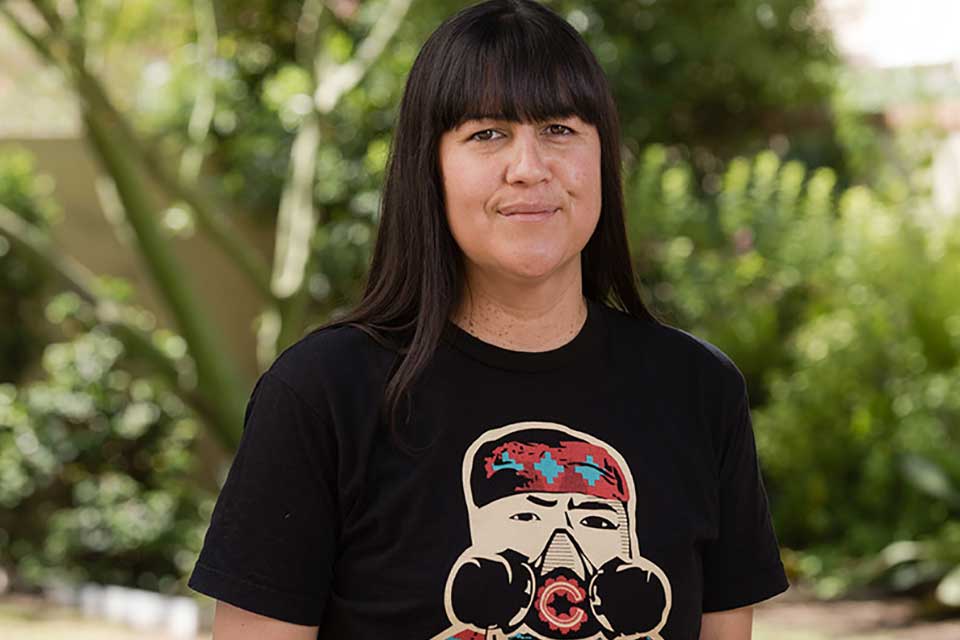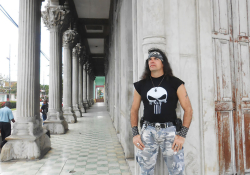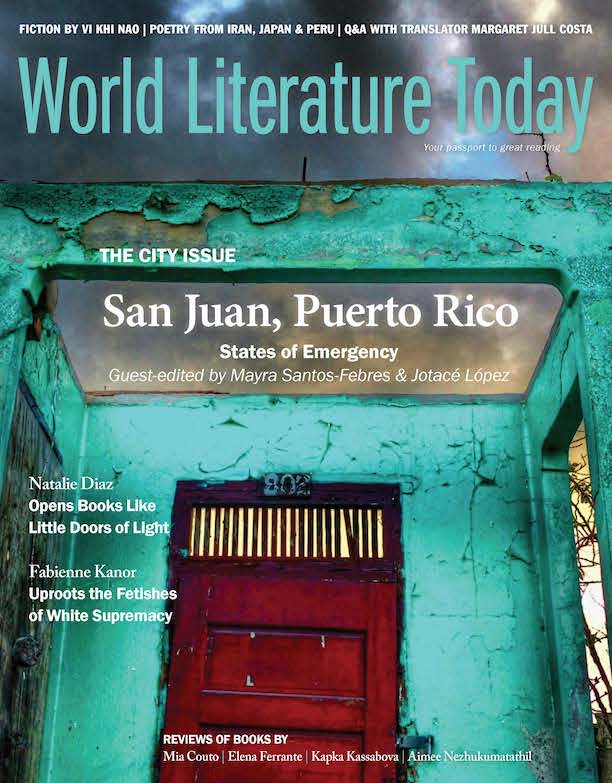Poetry as Wonder, Desire, Rage, and Memory: A Conversation with Natalie Diaz

I first collaborated with poet Natalie Diaz in 2017, when she wrote the introductory essay for a catalog I edited for Visualizing Language. This Pacific Standard Time–sponsored exhibition brought Oaxacan artist collective Tlacolulokos to the Los Angeles Central Library to install large murals featuring their contemporary portraiture of Zapotec migrants beneath—and in clear repudiation of—Dean Cornwell’s 1932 murals featuring “the discovery” of California. As I began to read her new verse collection, Postcolonial Love Poem, I recalled a brief, powerful sentence she wrote at the beginning of that essay: “Love, like art, is not subject to control or governance—they are two of the purest forms of potential.” The new book, a follow-up to her widely lauded debut, combines those two purest forms while rejecting the control and governance of colonial powers, whether governmental, personal, or aesthetic.
David Shook: You’ve spoken before about how you came to poetry through your family, and through your mother in particular, “even though she was denied poetry.” I too devoured my mom’s Reader’s Digests, and I feel like I learned my respect for language, for the power of the word, from my family, from their respect for the Word. I’m interested in your earliest beliefs about language, about how your mother gave you poetry.
Diaz: We live on our Mojave homelands and see the land’s stories all around us. We don’t name things after the white men who “discovered” our land—we name things for what has happened there, the ways we interacted with the land in that place. For example, here, Pach Karawhe (the Man of War) tried to lift the mountains but dropped them, and now the peaks are crooked and Mojaves are fallible; here is ‘Avii Hukyaampve, where Pach Karawhe taught the people, many whom were still in their animal form, to shoot arrows and other arts of war; here, is ‘Aha Kulooh, or the name for where our California village is located now, and it tells you that before the dam was built, this is where the river broke loudly against the bank.
My mother is a storyteller. She comes from this Mojave land and community of story. She has a limitless imagination and lexicon—she could have gone to college; she could have done anything. Instead, she took care of her father when he was sick, then her family after her father died. Then she took care of us. When I was a child, I was anxious and always worried about everything—I still am. My mother often rocked me to sleep reading me stories. She let me read anything I wanted—I read everything in the house, including the Reader’s Digests, a faux-leather bound Old West encyclopedia set from a raffle, my grandmother’s Danielle Steele novels. My mom is one of the funniest people I know, while also bearing a lot of weight and carrying many wounds. That’s the nature of language for me, that it holds within it all that has happened—to the earth, to the body, to the heart and mind, and also holds in it what we might shape or be shaped by in the future.
American poetry is as careful a design as a reservation is, as the MFA program is, as any wall or checkpoint.
Once, when I saw she had pulled out the giant black pot speckled with millions of distant white stars, which I called the galaxy pot because it seemed to have an infinitude of depth, a galactic capacity, I complained that we were eating beans again! My mother never addressed my complaint; never explained the beans were free on WIC, which I had thought was a kind of money up until then; didn’t address that the beans were connected to the fact that our electricity was shut off (the stove was gas) or that she was boiling water in the same pot for our baths that month. Instead she told me that beans wouldn’t give you gas if you chewed them more thoroughly. She launched into what seemed like legit science to me at that age—she was very serious, and I was interested in the experiment, eager even to eat beans that night. I spent the next several years eating my beans three times more slowly than my siblings. I’d miss out on seconds because I was still eating my first bowl, thoroughly chewing, invested in the hypothesis. That’s what poetry is like to me—it’s the gift of a bowl of bright beans and intestines of bright gas when the family and the house is on the brink of collapse.
Shook: As I was considering what I wanted to ask you, I was thinking about other contemporary American poets, and my mind snagged on the phrase “American poetry.” As a translator of numerous Latin American poets, I’m often frustrated by the exclusionary definition of what it means to be “American.” But it’s actually much worse than just that: the imposition of America’s very name meant the genocide of this land’s Native inhabitants, and with it an extermination of so many of their poetries and languages. Do you consider yourself an American poet?
Diaz: I’m lately spending a lot of time thinking about all the ways I have been prophesied in America. The incredible currency of identity in what is American poetry—how it makes you poor or rich in what seems to me to be arbitrary moments of categorization. How easy it is to subscribe to what is American poetry and then to prescribe it for others. The argument about why we should revere Walt Whitman. That Marianne Moore worked at Carlisle Indian Industrial School and lauded the school’s military leader for his great work at killing the Indian to save the man.
As well, I’m more and more unsatisfied and uncomfortable with the acronyms WOC and POC, American, contemporary, and categories such as emerging and midcareer. I am in the middle of my life on earth, and I am patient with my work. I have just completed my second book. I have had “success” by American poetry standards, and yet I might never have however many books it will take for them to categorize me as midcareer. I’ve had several careers—professional basketball player, linguist, poet, professor, and who knows what next. This is what I mean by arbitrary. I focus on this category, because it is a symptom of the same structure we turn to as we tell people what (not who) they are in the relationship of nation. Also, the crazy reality that race is our grandest and most employed definition while many Americans don’t seem to know what race is.
American poetry is as careful a design as a reservation is, as the MFA program is, as any wall or checkpoint. What to do about it? I don’t know. The part I am most concerned with is not what they are doing but what I let happen. What have I agreed to become because they told me it was who I was? I’m as much a part of the structure. I don’t know how to engage the questions cropping up around what is American or contemporary-American or joyful-American or rigorous- or political-American. I’m a little lazy in the question—a little out of shape of how to ask it. It will require some intensive and uncomfortable training and practice for me to put myself in the right condition to ask it in the ways I feel I must.
Shook: How did Postcolonial Love Poem come together? To me it reads as a very tight book, a cohesive whole, populated by recurring images from the natural world—water and snakes, skin and hands—and concerns. To what degree did you conceptualize it in its present form?
Diaz: This book is all itself, because it is all the things I am in wonder, in desire, in rage and anger, in imagination, in memory. Some readers won’t be able to hold all of the poems in the book at one time—they will immediately begin to edit me down, to try to shape me and the book to fit their projections of identity or poetry. The book is myriad, because I am myriad. But this book is the book that only I can write—I say that not in any poetical-hierarchical way, but in the energetic way that I need to feel in me in order to maintain my relationship to poetry and language. I thought of the book as a movement of bodies, of life energy, of lexical energy. I thought of the language and the poems as my own body and the way it loves or is loved, the way it wounds or has been wounded. I think of it as a little door of light in my sternum that leads to a labyrinth of blood and water and earth that leads to a dark cave behind my heart where there is another door of light—that is how I put it together.
I think of the book as a little door of light in my sternum that leads to a labyrinth of blood and water and earth that leads to a dark cave behind my heart where there is another door of light.
Shook: Throughout the book, you often employ a biblical diction, the Song of Songs–like “rose-horned rams” of a lover’s hips, for example, from the title poem, and deploy biblical references. What relationship does the Bible have to your work? What about faith more generally?
Diaz: I am Catholic and also Mojave. The ritual and ceremony of the Catholicism I grew up with is very linked to the ways we believe as Mojaves, the ways we ceremony and practice. The two ways of living are in relationship, in futuristic ways and in colonial ways. I think a lot about the ecstatic, which to me is very connected to the quantum world-ways my people believe—everything is an energy, and my body is a small gesture in the movement of that energy.
I’m also interested in the etymology of the English language—as well as the etymologies of my Mojave words, which feel different in that they have not evolved away from the earth and its nonhuman life. These etymological meditations often revert to religious or mystical stories. In regard to my own faith, my beliefs and practices are shaped like my desert—I understand the brutality of the world as well as I understand its will to live and ability to flourish. They are shaped like the river inside me. I try to understand my autonomy in relationship to who and what is around me, so that I don’t drink while another thirsts, and that is hard in the US.
Language is not the body but what might make the body act, and I wish that I will always be ready to act.
I believe in the beloved, that I can also be one as I love one. I go to mass and feel my life there. I walk out on my land or dunk into my river four times and feel my life. I guess I am not so sure about faith, and more wondering about what I need to do in order to make the kind of world I’d like to be a small part of. I’m always a little worried about writing these things down because they tend to sound a little self-help. Maybe what I mean is that I believe language is not the body but what might make the body act, and I wish that I will always be ready to act.
Shook: It’s easy to see how Postcolonial Love Poem dialogues with the poets who authored its epigraphs, from Harjo to Spillers, Rihanna to Sor Juana. What other poets or books do you think you’re in conversation with?
Diaz: My first poets were Lorca and Borges, and they were given to me by my first lover, along with Amichai and Darwish. Amichai and Darwish were my introduction to Palestine, which I consider a sister-land. Sor Juana was the first woman I read. I came late to Native literature, and in a way I am glad I did. It was lucky for me to search a little for myself before I found the ways I could be and also subvert what America projects onto Native writers. I consider the “conversation” to be one of listening, rather than believing my work is “like” these writers’. Lately I am trying to be quiet and to listen generously to Dionne Brand, to my friend Roger Reeves, to Alejandra Pizarnik, to Kamau Brathwaite, to Nikky Finney.
It is a gift to have a language that English is too small for, since I have a life that English thinks is small.
Shook: I’m interested in how your relationship with the Mojave language—both as a speaker and as a language preservationist—influences your poetry in English. (Tangentially, do you ever write in Mojave?)
Diaz: I don’t write fully in Mojave. I am not sure Mojave exists yet on the page. Of course, it can, it can do anything—jajaj, that was spoken like a true Mojave! I mean to express that Mojave exists in me beyond the page, whereas English came to me with its own page. I think my relationship to Mojave, my experience with both absence and loss, have let me be more careful with English—by careful, I mean tender and also wary. I know what English thinks of me. I know its limits in thinking of me. It is a gift to have a language that English is too small for, since I have a life that English thinks is small.
July 2020
A Review of Postcolonial Love Poem, by Natalie Diaz
by David Shook
 The poems in Natalie Diaz’s sophomore collection, released last spring by Graywolf, are biblical in scale and scope, ranging from the pastoral lyricism of a contemporary Song of Songs, as in the book’s titular poem, in which the addressed lover’s “hips are quartz-light and dangerous, / two rose-horned rams ascending a soft desert wash,” to the literal and metaphorical violence of family narratives, as in the following poem, “Blood-Light,” in which the narrator’s brother intends to stab their father. The poem itself acknowledges: “This could be a story from the Bible, / if it wasn’t already a story about stars.” Diaz’s poems also celebrate her love for the land she comes from, for the river that “is a part of [her] body,” and for her own physicality, often extolled through the lens of her relationship with basketball.
The poems in Natalie Diaz’s sophomore collection, released last spring by Graywolf, are biblical in scale and scope, ranging from the pastoral lyricism of a contemporary Song of Songs, as in the book’s titular poem, in which the addressed lover’s “hips are quartz-light and dangerous, / two rose-horned rams ascending a soft desert wash,” to the literal and metaphorical violence of family narratives, as in the following poem, “Blood-Light,” in which the narrator’s brother intends to stab their father. The poem itself acknowledges: “This could be a story from the Bible, / if it wasn’t already a story about stars.” Diaz’s poems also celebrate her love for the land she comes from, for the river that “is a part of [her] body,” and for her own physicality, often extolled through the lens of her relationship with basketball.
Postcolonial Love Poem is also a treatise on translation, not just as a literary craft but as a liminal and even physical space for the dispossessed. In “The First Water Is the Body,” the poet extends John Berger’s notion of the “third point of the triangle” and offers her own translations from the Mojave to explain the culture’s philosophical conception of the oneness of the river and the body, culminating in a haunting question with both ecological and metaphysical ramifications: “If I say, My river is disappearing, do I also mean, My people are disappearing?”
Diaz recently refuted, in an interview with Claire Jimenez for Remezcla, the idea that the act of love is primarily a form of resistance. This “dangerous way of thinking,” in her words, extends from the reductive—and racist—tendency to burden Indigenous and other minority writers with the responsibility to educate before celebrating, to overtly politicize everyday beauty, to resist the myriad prejudices and injustices of both the literary and wider worlds as a prerequisite to praising the body of a lover, exploring their connection to their land, or jokingly not joking about how Indians’ fearlessness to attempt sky hooks in games, “even though no Indian has ever made a sky hook,” makes them good at basketball. Diaz’s book is an education, an indictment of the American myth, and a defiance of the mythologization of this land’s Native inhabitants, but it is first a love poem.
Natalie Diaz was born and raised in the Fort Mojave Indian Village in Needles, California, on the banks of the Colorado River. She is Mojave and an enrolled member of the Gila River Indian Tribe. She is the author of Postcolonial Love Poem (2020) and When My Brother Was an Aztec (2012), winner of an American Book Award. She is a 2018 MacArthur Foundation Fellow, a Lannan Literary Fellow, and a Native Arts Council Foundation Artist Fellow. Diaz teaches creative writing in Arizona State University’s MFA program.













